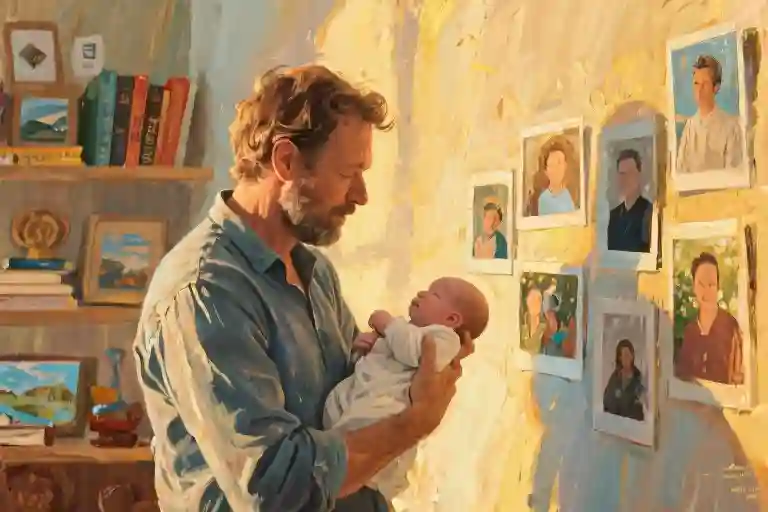At 42, I became a father for the first time—a fact that still surprises me more than anyone. For decades, I’d built a life where children simply didn’t factor in. My mornings began with coffee and newspapers, not diaper changes. My evenings involved spontaneous decisions, not bedtime negotiations. This wasn’t rebellion against parenthood; it was simply how my story unfolded, one childfree year after another.
What fascinates me now isn’t just my late transition into fatherhood, but the collective eyebrow-raising that preceded it. Society has this peculiar habit of treating childlessness as a temporary condition, like a cough that’ll eventually clear up. “You’ll change your mind,” they’d say at dinner parties, their voices dripping with the certainty of fortune tellers. As a man, I received these predictions with mild amusement—the pressure cooker of biological clocks and maternal expectations never quite reached my doorstep the way it did for my female friends.
The real curiosity lies in how we’ve collectively decided that not wanting children requires justification, while wanting them doesn’t. Nobody ever asks parents-to-be, “But why do you want kids?” with the same suspicious tone reserved for those who opt out. My standard answer—”I just don’t”—was never satisfactory. It lacked the trauma or tragedy people seemed to expect, the dramatic backstory that would make my choice palatable. The truth was ordinary: I enjoyed my life as it was, and the absence of children didn’t feel like an absence at all.
Then came the twist even I didn’t see coming. Love has a way of rewriting our personal manifestos. When I met Sarah, her then six-year-old daughter handed me a juice box with the gravity of a royal scepter. In that mundane exchange, something shifted. Not an instant paternal awakening—those exist only in movies—but the quiet realization that love might look different than I’d imagined. Three years later, our son arrived, and with him, the delicious irony that the man who never wanted kids would spend his forty-third birthday assembling a crib.
This isn’t a story about right choices or conversion experiences. It’s about the invisible scripts we follow until life offers us better ones. Parenthood, I’ve learned, isn’t the default—it’s just one possible rhythm in the symphony of human connection. And sometimes, the most interesting lives are those that dare to change their tempo.
The Freedom and the Questions: My Life Without Children
For nearly two decades, my calendar belonged entirely to me. Weekends meant spontaneous road trips with nothing but a backpack and a tank of gas. Evenings dissolved into uninterrupted reading sessions that stretched past midnight. My bank statements showed line items for concert tickets and whiskey tastings rather than daycare fees and pediatrician visits. This wasn’t rebellion—just the quiet rhythm of a life where personal freedom wasn’t theoretical but practiced daily.
Strangers often assumed my childlessness was temporary. ‘You’ll settle down when you meet the right woman,’ a bartender once told me while pouring my third martini. Colleagues exchanged knowing glances when I declined baby shower invitations. ‘He just hasn’t found someone to change his mind,’ their silence seemed to say. The most persistent interrogations came during family gatherings, where aunts wielded casseroles like bargaining chips. ‘Don’t you want someone to carry on the family name?’ they’d ask, as if genealogy required my personal participation.
What surprised me most wasn’t the questions themselves, but their underlying assumption: that my choice required justification. Nobody demands explanations from people who want children—that desire is treated as innate and universal. Yet when I simply said, ‘It’s not for me,’ my answer was treated as a puzzle to be solved rather than a position to be respected. The irony? As a man, I faced far fewer interrogations than my female friends who’d made similar choices. Where I received gentle teasing, they endured outright hostility—accusations of being ‘selfish’ or ‘against nature.’
There were moments when the pressure seeped through. Watching friends post back-to-school photos sometimes stirred a vague unease, like hearing laughter from a party I hadn’t been invited to. But the feeling always passed, replaced by the tangible pleasures of my unencumbered life: sleeping through thunderstorms without a crying child to soothe, spending an entire Sunday rebuilding a motorcycle engine, booking a one-way ticket to Reykjavik because the northern lights forecast looked promising. These weren’t compensations for some imagined lack—they were the active ingredients of a life I’d deliberately designed.
Yet design implies more control than any of us truly have. The same spontaneity I cherished in my childfree years would eventually lead me to reconsider everything—not through logic or societal pressure, but because of a woman who made me wonder if love could rewrite even my most settled convictions.
The Unexpected Turn: How One Person Changed Everything
I never saw it coming. At 42, I found myself holding a newborn—my newborn—with the same bewildered expression I imagine cavemen had when they first discovered fire. The irony wasn’t lost on me. For two decades, I’d built a comfortable life around the certainty that parenthood wasn’t for me. My calendar was filled with spontaneous trips and late-night work sessions, not pediatrician appointments and PTA meetings. The rhythm of my days followed my own desires, not a child’s demands.
Then Sarah happened. We met at a bookstore, of all places, both reaching for the same obscure collection of essays. She had this way of tilting her head when listening, as if every word mattered. On our third date, she mentioned her daughter Emily. The confession came with a pause, that slight hesitation people get when disclosing dealbreakers. I surprised us both by not running for the hills.
What followed was a quiet revolution in my thinking. Sunday mornings shifted from hungover brunches to pancake breakfasts with a seven-year-old who took syrup application very seriously. I discovered crayon marks on my favorite chair and, against all logic, didn’t mind. The first time Emily fell asleep on my lap during movie night, something primal stirred—a protective instinct I didn’t know I possessed.
Sarah never pressured me about having more children. That’s what made the change so disorienting. My decision grew organically from watching her parent—the way she balanced discipline with warmth, how she turned mundane moments into adventures. Where I’d once seen parenthood as a series of sacrifices, she showed me its hidden joys: the conspiratorial giggles during hide-and-seek, the proud presentation of a lopsided clay sculpture.
The turning point came during a family camping trip. As I watched Emily triumphantly roast her first marshmallow (blackened to a crisp, naturally), it hit me: I wanted more of this. Not the idealized version of parenting sold in commercials, but the messy, beautiful reality of helping tiny humans become themselves. That night, under a sky dusted with stars, I asked Sarah if she’d consider having a child with me.
Looking back, I recognize how privilege shaped my journey. As a man, I’d been spared the constant biological clock commentary women face. My change of heart was seen as maturation rather than inconsistency. This double standard still bothers me—why is a woman’s decision not to have children treated as temporary, while a man’s similar choice gets a respectful nod?
Parenthood, I’ve learned, isn’t about checking some universal life script box. It’s about finding your particular people—whether that includes children or not—and building a life that fits. For me, that fit came later than most, shaped by love rather than obligation. And if there’s one thing I want other late-in-life parents (or happily childfree folks) to know, it’s this: Your timeline is yours alone. No justification needed.
The Unseen Gender Divide in Parenting Expectations
It took me years to notice the quiet privilege in how people questioned my childfree choice. As a man in my thirties, the inquiries came sporadically – usually wrapped in half-joking remarks at family gatherings. “When are you going to settle down?” my uncle would ask between football plays, already moving on to the next topic before I could answer. Female friends reported entirely different experiences; their life choices dissected with surgical precision at every turn.
The contrast became undeniable during a dinner party where six couples debated parenting. My casual “not for me” statement earned nodding acceptance, while Sarah – a marketing director across the table – faced an immediate interrogation. “But don’t you worry about regretting it?” “What if you meet someone who wants kids?” The questions kept coming, each implying her stance required justification where mine apparently didn’t. We’d made identical choices, yet society demanded her defense papers while granting me a free pass.
This disparity extends beyond casual conversations. Workplace dynamics reveal similar patterns. While childfree men often receive praise for being “dedicated professionals,” women face assumptions about being “too career-focused.” I’ve watched female colleagues get passed over for promotions with whispered concerns about “when she’ll have babies,” while my uninterrupted work history became an unspoken advantage. The biological clock myth weighs disproportionately on women, creating artificial deadlines that men simply don’t face.
Parenting roles themselves carry gendered expectations that shape these interactions. Society still largely views fatherhood as optional enrichment – something that enhances but doesn’t define a man’s identity. Motherhood, conversely, remains treated as mandatory fulfillment, with women who opt out facing labels like “cold” or “selfish.” These unspoken rules explain why my parenting decision could be casual until love intervened, while women face pressure to declare their reproductive intentions like constitutional amendments.
The most revealing moment came when my partner and I announced our pregnancy. Congratulations for me focused on legacy (“Carrying on the family name!”), while hers centered on sacrifice (“Your life will never be the same!”). Same child, radically different narratives. These scripts aren’t just outdated – they’re actively harmful, limiting how all of us imagine our possible lives.
Perhaps what we need isn’t equal scrutiny, but equal freedom. The right to say “yes,” “no,” or “not yet” without gendered judgment. To acknowledge that parenting decisions – like all meaningful choices – emerge from complex personal landscapes that no demographic category can predict. My winding path to fatherhood proves how little these assumptions actually explain, and how much we lose by insisting they should.
Redefining the “Right” Life Path
The moment my daughter first wrapped her tiny hand around my finger, I understood something fundamental about life choices: society’s scripts are written in pencil, not stone. For decades, I’d confidently navigated adulthood without the parenthood chapter so many consider mandatory. My story wasn’t rebellion—just a different interpretation of what constitutes a complete life.
We inherit these invisible templates early: graduate, marry, reproduce. The sequencing may vary, but the checklist persists. When you opt out of even one item, the system glitches. Colleagues assume you’re hiding fertility struggles. Distant relatives whisper about “commitment issues.” Strangers feel entitled to diagnose your life choices between appetizers and main course at dinner parties.
What fascinates me most isn’t the pressure itself, but its gendered asymmetry. As a man, my childfree years were framed as “focusing on my career”—a temporary delay rather than a permanent stance. Female friends faced harsher scrutiny; their wombs treated as communal property with expiration dates. This double standard reveals how deeply reproductive expectations are entangled with cultural notions of masculinity and femininity.
Parenthood became right for me not through societal pressure, but through a quiet realization: autonomy means having the freedom to change your mind as much as the freedom to stand your ground. That’s the nuance missing from most debates about voluntary childlessness. We frame it as a binary—either you want kids or you don’t—when human desires are more like tide pools, shaped by the unique contours of our relationships and experiences.
The myth of the “right” timeline persists because it offers comfort. If everyone follows the same path, no one has to sit with the discomfort of uncertainty. But life’s richest moments often come from off-script detours—whether that’s becoming a father at 42, or never becoming one at all.
Perhaps true adulthood isn’t about checking boxes, but developing the courage to leave some blank. To say “this doesn’t belong in my story” with the same conviction as “this does.” After all, the most interesting narratives aren’t those that follow the expected plot points, but those brave enough to rewrite the tropes altogether.
If Parenthood Isn’t Mandatory
The question lingers like an uninvited guest at every family gathering: What if you change your mind? For years, I carried this societal baggage without unpacking it – until life forced me to confront the very assumption behind that question. Parenthood came to me sideways, at 42, through a backdoor I never knew existed.
Here’s what nobody prepares you for: deciding against children often requires more courage than having them. The world has ready-made scripts for parents – diaper commercials, parenting blogs, entire sections of bookstores. But those of us who stray from the parenthood path? We’re left to improvise our defense against raised eyebrows and well-meaning but exhausting interrogations.
As a man, I occupied this strange middle ground. My child-free years were met with mild curiosity rather than the urgent concern my female friends faced. Where they got “Your biological clock is ticking!”, I received “Plenty of time yet” – the same societal pressure, diluted by gender and served with a side of oblivious privilege.
Then came the twist even I didn’t see coming. Love reshuffled my carefully arranged priorities. Not some abstract longing for fatherhood, but the concrete reality of wanting to build a life with one particular person who happened to want children. This wasn’t a philosophical conversion; it was a personal evolution. The same man who once valued uninterrupted sleep and spontaneous travel found himself learning to appreciate the chaotic beauty of bedtime stories and sticky fingerprints on tablet screens.
Which brings us to the uncomfortable truth we rarely discuss: both parenting and not parenting involve compromise. The child-free sacrifice certain emotional depths and family traditions; parents surrender autonomy and quiet Saturday mornings. Neither path is inherently superior – just different landscapes with their own vistas and valleys.
So I’ll leave you with this: What does your unscripted life look like? Not the version expected of you, but the one that aligns with your deepest truths – whether that includes parenting, excludes it, or lands somewhere in between. Because ultimately, the most radical choice isn’t having kids or remaining child-free; it’s granting yourself permission to design a life that fits, even when the template doesn’t.





